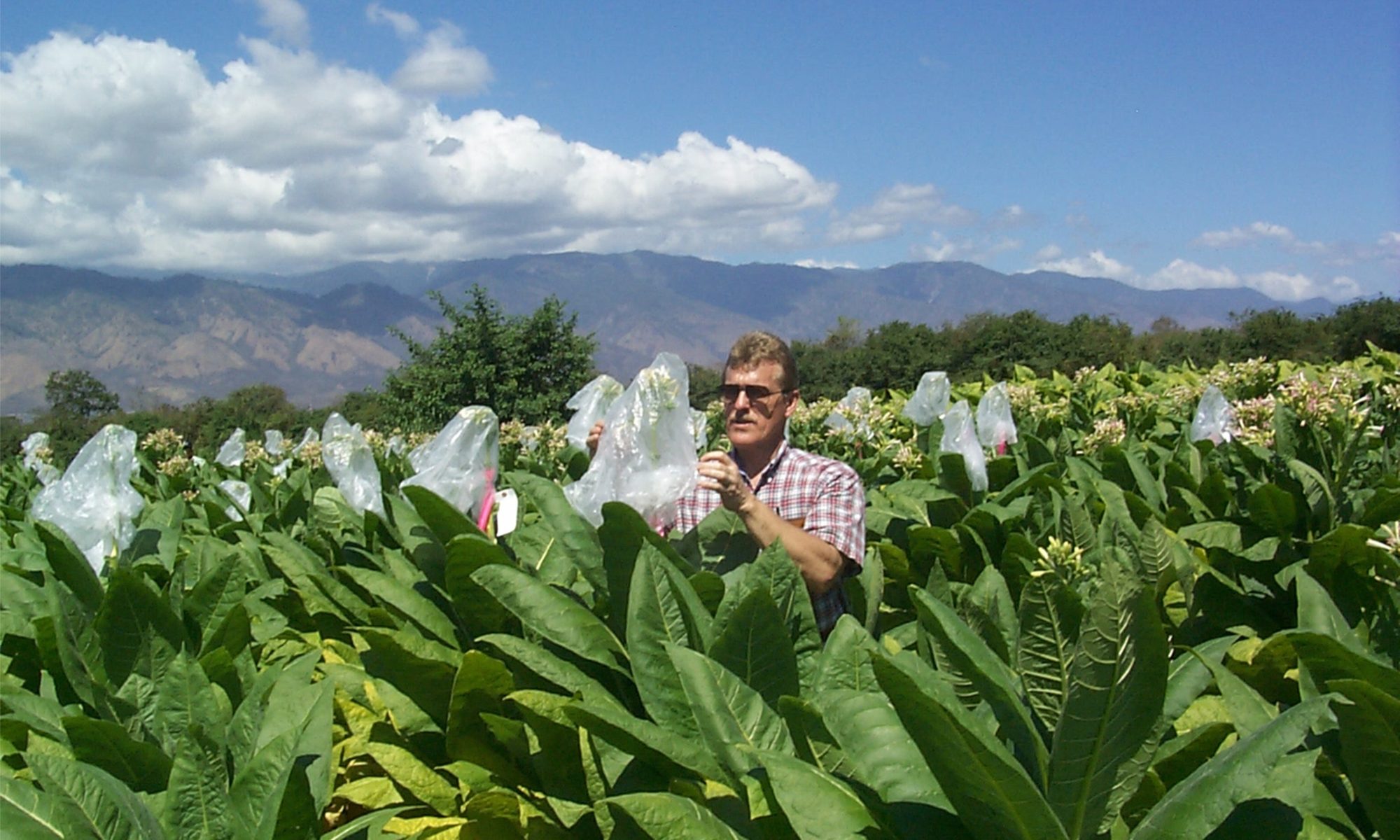
Greeneville Researcher Transformed Worldwide Tobacco Production
KNOXVILLE, Tenn. — Renowned University of Tennessee tobacco breeder and geneticist Robert Miller has retired. His forty-year career with UT AgResearch, much of it based in Greeneville, was filled with breakthrough achievements that transformed tobacco production in northeast Tennessee and around the globe.
Miller is internationally recognized for his development of disease-resistant burley and dark fire-cured tobacco varieties. The varieties he developed benefitted Tennessee producers and producers well beyond the state’s borders. In fact, the varieties became, and continue to be, grown throughout the world.
Miller’s TN 86 was the first tobacco variety of any type to have resistance to tobacco poty-viruses, which caused millions of dollars in losses to tobacco producers each year. Virtually all subsequent virus-resistant varieties of all tobacco types grown in the world today derive their resistance from TN 86. As evidence of that variety’s importance to worldwide burley tobacco production, TN 86 is one of only two varieties celebrated in the Chinese Tobacco Hall of Fame.
TN 90, the second variety Miller developed, was the first burley variety to have resistance to seven diseases. At one time TN 90 was generally regarded within the tobacco industry as the most widely grown burley variety in the world.
In 1999, UT and the University of Kentucky merged their tobacco breeding programs with Miller named as principal investigator. At that time, he left Greeneville to work at the University of Kentucky in Lexington, Kentucky. Reflective of his joint roles, Miller held the titles of research professor of plant sciences at UT and professor of plant and soils sciences at UK. The joint UT-UK program he headed has released 11 burley and 9 dark disease-resistant tobacco varieties that are widely grown throughout Kentucky and Tennessee. Based on seed sales, approximately 75 to 85 percent of burley and 25 to 30 percent of dark tobacco crops in the United States utilize varieties that Miller developed. These highly disease resistant varieties have greatly reduced yield losses from black shank and Fusarium wilt, two soil-borne diseases that often caused the loss of entire crops. Many of the varieties Miller developed also have modified chemistry that significantly decreases harmful compounds in tobacco products.
“TN 86 and TN 90 are still probably the most significant varieties that I have developed. All of the work on these two varieties was conducted here in Greeneville at the (now-named) UT Northeast Tennessee AgResearch and Education Center,” Miller says.

“Being stationed in Greeneville and having the opportunity to interact with area growers from 1982 through 1999 was excellent. Karen and I were blessed to be able to return to Greeneville in 2006. My family and I have many happy memories of our years here. This has become, and always be, our home.”
Jeff Aiken has grown Miller burley varieties on his family farm he operates with his brothers in Telford, Tennessee. The longtime president of the Tennessee Farm Bureau Federation says, “Being an East Tennessean, I’m very proud the University of Tennessee Northeast Tennessee Research and Education Center in Greeneville has been the location where so many outstanding varieties of tobacco have been developed for the last 40 years, thanks to the work of Dr. Bob Miller. It has allowed me, as well as farmers around the world, to be more productive and profitable as his varieties have addressed disease issues, improved yields, and better quality characteristics.”
Aiken adds, “Dr. Bob has provided more positive impact for tobacco farmers through his work than any other individual during my lifetime, but perhaps just as significantly, he has always been a great friend and mentor to me and many other farmers.”
Justin L. McKinney, director of the Northeast Tennessee Center, says he shares Aiken’s opinions of Miller and his achievements. “Dr. Robert Miller is an extraordinarily gifted mentor to me, and a plant breeder who has assisted tobacco producers around the world for the past four decades through the development of improved tobacco genotypes in plant breeding. The extent of his contributions to the field of agriculture are unquantifiable, and the UT Institute of Agriculture is a better institution for having him all this time. I know that I am personally better for knowing him.”
Miller has received distinguished honors throughout his career in recognition of his contributions to tobacco growers and the tobacco industry. These include the Philip Morris USA Award for Distinguished Achievement in Tobacco Science; the Burley Tobacco Co-op Leadership Award; the J.W. Massengill Award for Distinguished Service to Agriculture; the UTIA Research Impact Award; the UTIA Epsilon Sigma Phi State Team Award; and the Murray State University Distinguished Service to Agriculture Award.
Another honor for his impacts is the newly established Robert and Karen Miller Outstanding Graduate Student Awards established within UT AgResearch. The annual awards will recognize one master’s student and one PhD student in the UT Herbert College of Agriculture and UT AgResearch who have demonstrated valuable contributions to science and engineering, such as a new discovery, publication or presentation. The awards are intended to assist graduate students in preparing for careers with impacts such as those Miller himself achieved.
Through its land-grant mission of research, teaching and extension, the University of Tennessee Institute of Agriculture touches lives and provides Real. Life. Solutions. utia.tennessee.edu.